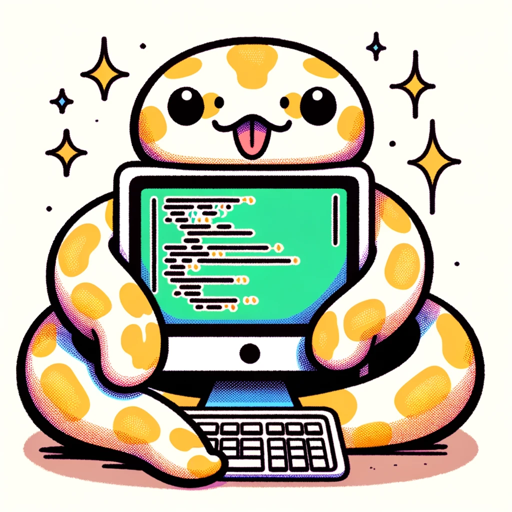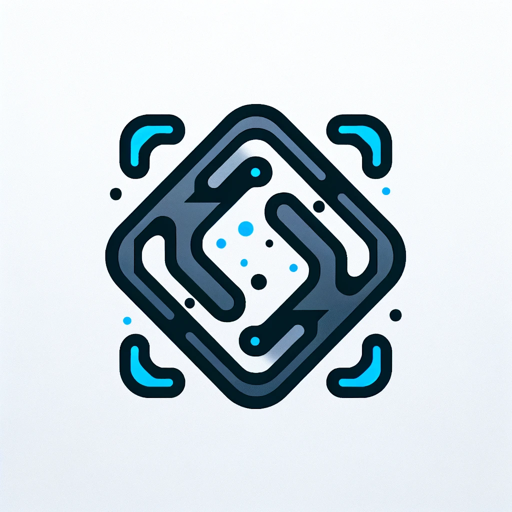Code Companion-AI-powered code assistant tool
AI-powered assistant for faster coding
How do I optimize this Python function?
Can you help debug my JavaScript code?
What's the best way to structure a SQL query here?
Suggest improvements for my C++ algorithm.
Related Tools
Load MoreCodeCompanion
CodeCompanion is your programming ally. Assisting with coding queries, it offers solutions for novices and experts alike. Let CodeCompanion be your guide in the complex world of programming.

Code Companion
I'm a Python specialist here to help you code and learn! | Proficient in all coding languages, web design & much more!

VSCode Code Companion
Your go-to expert for all things VSCode.

Code Companion
I provide full code snippets, optimized for performance and high quality code.

Code Companion
I offer clear code solutions with brief explanations.

Code Companion Turbo
A friendly GPT for programming support, providing direct code assistance and explanations.
20.0 / 5 (200 votes)
Introduction to Code Companion
Code Companion is a specialized assistant designed to support developers and coders by offering comprehensive, context-aware coding help. Its core purpose is to provide real-time assistance with code, including troubleshooting, optimization, generating code snippets, explaining algorithms, and assisting in file navigation without interrupting workflow. It's highly suited for individuals working with extensive codebases, where efficiency and precision are critical. For example, if you're working on a complex Python application and need help optimizing a slow algorithm, Code Companion can suggest more efficient code structures, analyze performance issues, and explain potential improvements in detail.

Key Functions of Code Companion
Code Analysis and Debugging
Example
You can paste a snippet of code that is throwing an error, and Code Companion will analyze it to detect bugs or logic issues.
Scenario
Imagine you’re working on a JavaScript project and encounter a syntax error that’s preventing your code from running. You paste the code into Code Companion, which highlights the error and suggests the correct syntax, resolving the issue quickly without the need for manual debugging.
Code Optimization
Example
Code Companion can review a block of inefficient code and propose optimized alternatives, whether it’s about reducing time complexity or improving memory usage.
Scenario
In a Python project, you might have a function with O(n^2) complexity that slows down your program with large datasets. Code Companion analyzes the function and suggests a more efficient O(n log n) algorithm, explaining how it will improve performance.
Real-time File Navigation
Example
Code Companion helps developers work through large files and codebases by providing assistance based on file structure without displaying irrelevant details.
Scenario
You’re working on a complex Node.js project with multiple files and modules. While trying to fix a bug, you need to locate a specific function in a large file. Code Companion allows you to ask for that function directly without requiring you to scroll through irrelevant code, speeding up your workflow.
Ideal User Groups for Code Companion
Software Developers and Engineers
Code Companion is designed for professional software developers who work on complex applications, requiring real-time assistance for debugging, optimization, and code comprehension. These users benefit from the tool's ability to swiftly navigate codebases, suggest more efficient code patterns, and resolve errors without slowing down their workflow.
Students and Learners
For computer science students or individuals learning to code, Code Companion serves as a valuable tutor. It helps them understand difficult concepts, debug their code, and learn best practices. It’s especially useful for those learning new languages or tackling difficult algorithms, as it offers detailed explanations and step-by-step guidance.

How to Use Code Companion
Visit aichatonline.org for a free trial without login, also no need for ChatGPT Plus.
Start by accessing the website and explore the full features without requiring an account or any paid subscription.
Familiarize yourself with the tool’s core capabilities.
Code Companion assists in coding, debugging, and navigating code files seamlessly. Understand the wide range of coding tasks it can perform before diving into specific use cases.
Prepare your code or programming-related queries.
Ensure you have specific coding problems or queries. Code Companion works best when provided with clear, actionable inputs like code snippets, algorithms, or specific debugging needs.
Interact using natural language and precise requests.
Pose coding-related questions or tasks using natural language. You can request explanations, optimizations, or improvements to your code without needing specialized commands.
Leverage additional tools for complex tasks.
Use integrated tools like Python execution or image generation (for data visualization) to augment your coding workflow and enhance output accuracy.
Try other advanced and practical GPTs
MondayMaster
AI-powered automation and integration for Monday.com

Make Automation Pro
AI-Powered Automation for Everyone

Make A Sheet
AI-powered CSV generation made easy

Business Research
AI-powered insights for better business decisions

Irish Language Tutor (Gaeilge/Gaelic)
AI-powered Irish language learning

PortfolioPilot
AI-powered financial insights

英語先生(繁體中文讀者)📓
AI-powered English to Traditional Chinese translation and learning

翻譯蒟蒻 ( 英語 )
AI-powered translation for Chinese and English.

英語名言サーチ
AI-powered bilingual quotes search for deeper insights

英語教師
AI-powered English Language Teacher

株式投資屋(stockbroker)
AI-powered stock analysis for informed investing

通达信公式专家
AI-powered trading formula expert.

- Optimization
- Debugging
- Learning
- Automation
- Code Review
Frequently Asked Questions About Code Companion
What programming languages does Code Companion support?
Code Companion supports a wide variety of languages including Python, JavaScript, Java, C++, HTML/CSS, and more. It also helps with frameworks, libraries, and debugging across different stacks.
Can I use Code Companion for debugging my code?
Yes, Code Companion is highly effective at identifying and fixing bugs in your code. You can provide a snippet, and it will analyze potential issues, suggest fixes, or even explain the root cause.
How does Code Companion handle large codebases?
For large codebases, Code Companion can break down complex sections, offer refactoring suggestions, and efficiently navigate through various files or modules without losing context, making it great for larger projects.
Is there a way to run code directly through Code Companion?
Yes, Code Companion can run Python code directly in its environment, allowing for quick testing, calculations, and even visual output like charts or graphs.
Can Code Companion help me learn new programming concepts?
Absolutely. Beyond solving coding problems, Code Companion can explain concepts, provide learning resources, and walk through step-by-step explanations for algorithms or data structures.